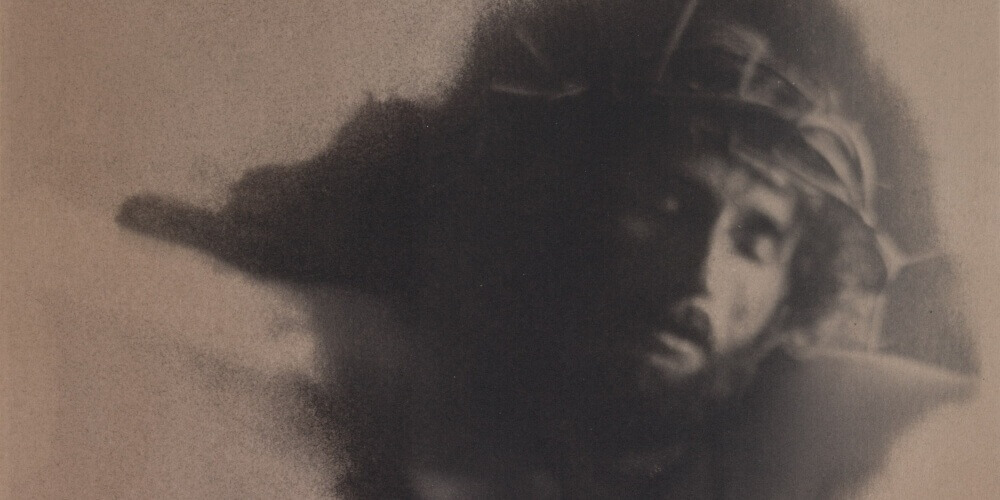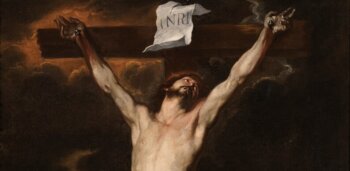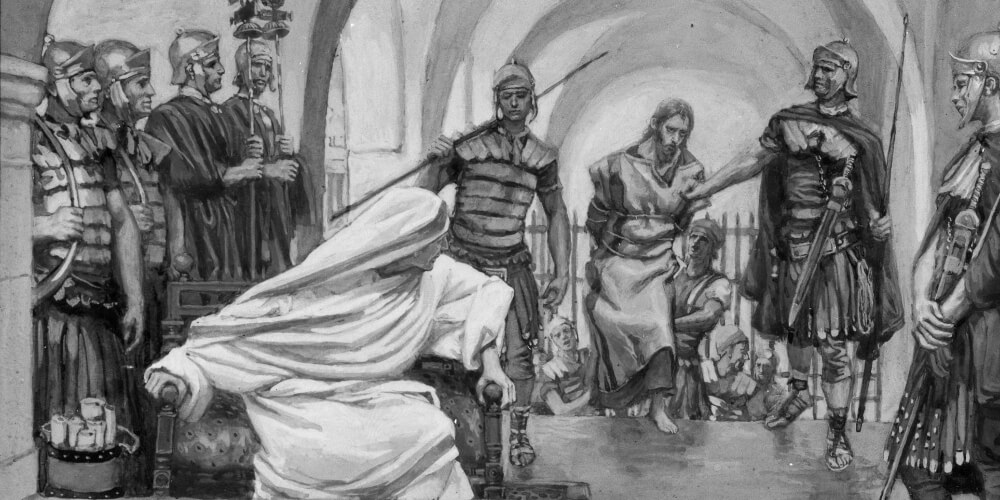
Christ is in the hands of His enemies, who have long sought His destruction. They lead Him in chains back to Jerusalem.
It is now, Our Lord says, “the time for the power of darkness” (Luke 22:53).
What follows—through the night and into the morning of Good Friday—is a series of episodes that together constitute the trial of Jesus.
To modern readers, His trial can seem like a convoluted affair.
To begin with, Christ had four separate judges—Annas, Caiaphas, Pilate, and Herod—in four separate places. We must also contend with the two competing legal codes (one Roman and the other Jewish) which overlap and compete with one another.
Let’s untangle these threads and learn why Christ’s trial happened the way it did and why—despite His innocence—He was sent to Golgotha.
Christ Before the Sanhedrin

It is the middle of the night, so the crowd of soldiers and guards cannot bring Jesus to trial right away.
Instead, they bring him to the house of Annas, the father-in-law of Caiaphas, high priest for that year. Annas and Caiaphas are clear allies—united by their class and station, as well as the family bonds of matrimony.
Annas interrogates Christ, but finds no excuse for conviction, so he sends Jesus to Caiaphas for a more formal trial before the whole Sanhedrin.
Caiaphas is the one who had—on hearing of the raising of Lazarus—suggested that Christ die in order to prevent conflict with the Romans:
“[It] is better for you to have one man die for the people than to have the whole nation destroyed.”
John 11:47-50
“It was thus evident,” says Venerable Fulton Sheen,
that he and the Sanhedrin had resolved upon the death of Christ before the trial took place. A night trial of the Sanhedrin was illegal, but in the mad desire to do away with Christ, it was held nevertheless. Though it had no right to proceed to a capital execution, it did retain, however, the power to institute trials.
Life of Christ
And so the high priests begin to question Jesus “about his disciples and about his teaching” (John 18:19).
They have no intention of learning anything—they are only hunting for a reason to justify their malice.
These are the same chief priests who extorted the Temple worshippers in the name of upholding the law; they would not flinch from murder if they could rationalize it through the law.
Our Lord saw the trickery behind the questions, and with absolute fearlessness, born of innocence, answered that His doctrine was known to the people and those who heard Him could give testimony…
Venerable Fulton Sheen, Life of Christ
The Sanhedrin doesn’t want Christ’s answer. They want His death.
So the chief priests bring in false witnesses, but these witnesses contradict each other.
Having failed several times already, Caiaphas reaches for his final weapon: his office as high priest.
“I put you under oath before the living God, tell us if you are the Messiah, the Son of God.”
Matthew 26:63
By the Law of Moses, Jesus is bound to reply. But Christ is the author of that law, and He is its purpose.
Nonetheless, God chose this moment to reveal Himself with the same words—the same name—by which He had revealed Himself to Moses through the burning bush. He now says two words which drop like a hammer upon the high priests:
I AM
Mark 14:62
And Jesus does not stop there.
He tells the high priests that they “will see the Son of Man seated at the right hand of Power and coming on the clouds of heaven” (Matthew 26:64). In these words, He uses the verbiage of the Prophet Daniel, and claims to be the chosen one of God who holds eternal power at God’s right hand (cf. Daniel 7:13-14).
Then the high priest tore his clothes and said, “Why do we still need witnesses? You have heard his blasphemy! What is your decision?” All of them condemned him as deserving death. Some began to spit on him, to blindfold him, and to strike him, saying to him, “Prophesy!” The guards also took him over and beat him.
Mark 14:63-65
Now that Christ has claimed His Divinity, his enemies can openly condemn Him.
And now that He has been condemned, they can freely abuse Him, for blasphemers are not protected by any law.
They covered His face and thus shut out the light of heaven; and yet in covering His eyes, it was their own they blinded.
Venerable Fulton Sheen, Life of Christ
Christ Is Charged Before Pilate
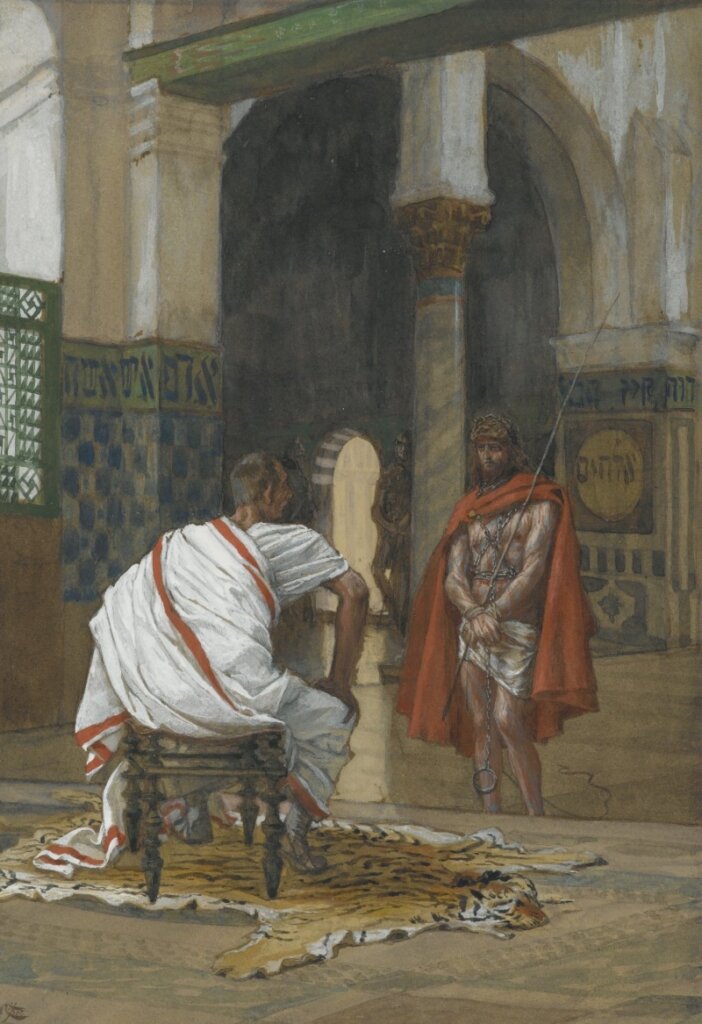
Now it is morning, and the Jewish authorities bring Jesus before the Roman authorities.
Only Rome has power over life and death within Judea. In particular, the death sentence has to come from the Roman governor: Pontius Pilate.
As with the cooperation between the Pharisees and Herodians, the cooperation between the Jews and Pilate was shockingly unusual.
Pilate had been governor for about ten years. He had once tried to erect Roman images in the Temple—which nearly led to a massacre until the emperor pressured Pilate to back down. Another time, he had confiscated the Temple treasury to build an aqueduct, which led to a riot and the deaths of some Galilean Jews.
Consider Pilate’s position for a moment: Judea has always been troublesome. The Jews hate Roman rule in general, and Pilate in particular. At this very moment Jerusalem is overflowing with crowds for the Passover Feast—the pinnacle celebration in a religion that the Romans find archaic, bloody, and fanatical.
Now, Pilate wakes up and hears that the leaders of the Jews have brought him a man they want to execute. Pilate knows, or will soon learn, that this man has recently started a riot in the Temple and, according to His accusers, is setting Himself up as a king. In any case, this man has crowds of followers so large that all the Jewish authorities fear His power.
Pilate tries to avoid this situation altogether. “Take him,” he says, “and judge him according to your law” (John 18:31).
But the Jews will not be satisfied unless the man dies. To convince Pilate, they bring three charges:
“We found this man misleading our people; he opposes the payment of taxes to Caesar and maintains that he is the Messiah, a king.”
Luke 23:2
Note that the Sanhedrin do not mention blasphemy, which is, theoretically, their own justification for wanting Christ to die.
Instead, they choose charges which will get Pilate’s attention: political subversion, tax evasion (equivalent to rebellion in Roman eyes), and plans to usurp authority.
Pilate Speaks with Jesus
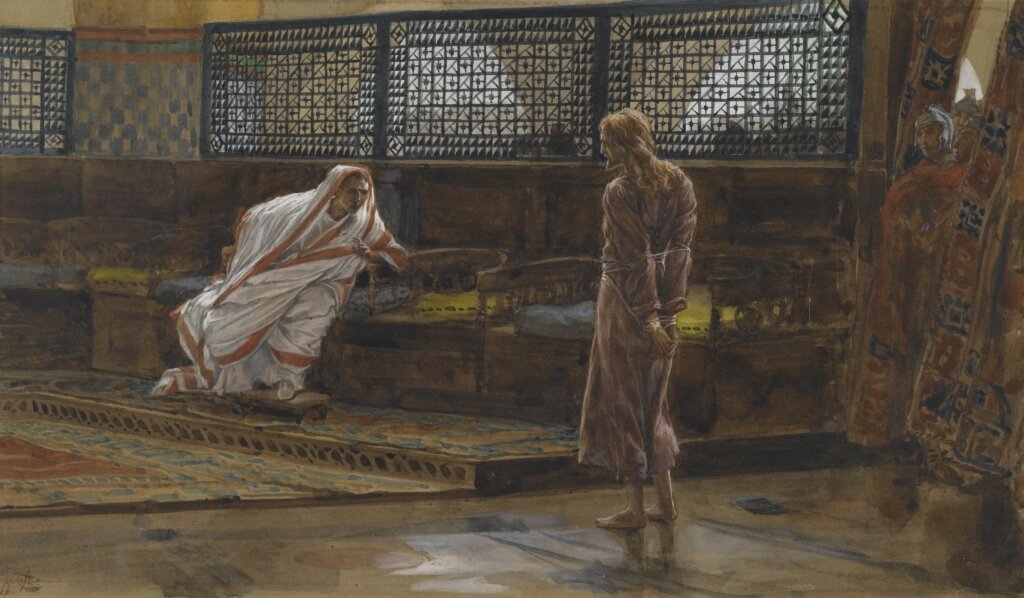
Pilate brings Jesus inside and questions Him. A full moral and theological reading of this encounter lies outside the scope of our narrative here, but let’s imagine for a moment what Pilate may have thought of this prisoner.
Here before him is a man who, though bound and beaten, is both meek and eloquent. He speaks of Truth, but “What is truth?” He speaks of Kingship, but a kingship not of this world. He speaks of armies, but says His followers are not striving to free Him. He says that He came into the world from somewhere else, as if He’d always existed.
Pilate may not have understood Christ’s meaning, but he clearly did understand—perhaps more clearly than some of Christ’s own followers—that Jesus was not after an earthly kingdom.
Ultimately, that is Pilate’s only concern: political peace, held in place by Rome’s power.
So Pilate goes back out to the crowds: “I can find no fault in him,” he says (John 18:38).
But the Sanhedrin is insistent. They say that Jesus has been spreading anti-Roman sedition from Galilee all the way to Judea.
Immediately upon hearing that Jesus is a Galilean, Pilate realizes that he may not have to deal with this problem. He tries to pass it off to King Herod, who ruled Galilee (at least in name). Herod was in Jerusalem—presumably for Passover.
Hoping to extricate himself from this delicate political situation, Pilate orders that Jesus be sent off to the Jewish king.
Christ Before Herod
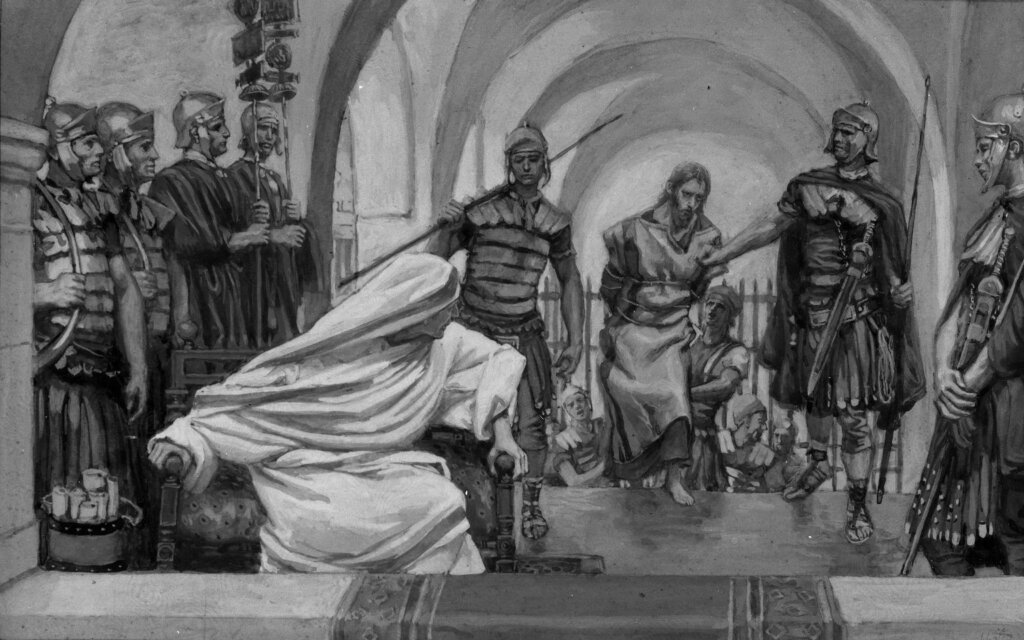
Christ is now brought to Herod Antipas, John the Baptist’s cowardly killer.
Herod was very glad to see Jesus; he had been wanting to see him for a long time, for he had heard about him and had been hoping to see him perform some sign. He questioned him at length, but he gave him no answer. The chief priests and scribes, meanwhile, stood by accusing him harshly. Herod and his soldiers treated him contemptuously and mocked him, and after clothing him in resplendent garb, he sent him back to Pilate.
Luke 23: 8-11

Herod views Christ as a toy, another obsequious courtier who might amuse him for a time.
When this so-called prophet refuses to play along, Herod releases him to whatever doom might await Him.
In a final insult, Herod sends Him away adorned in a rich garment, to mock Christ’s plight and to showcase his own garish opulence.
The Final Sentence
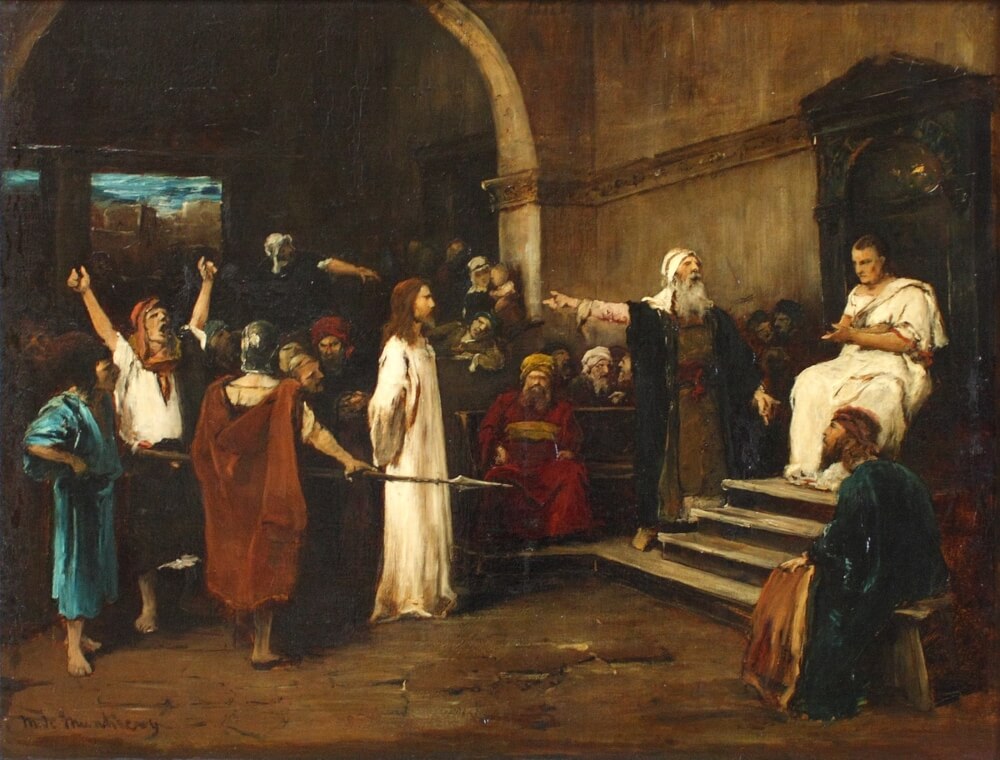
“Pilate saw the mob,” Venerable Fulton Sheen writes, “with Our Lord in the midst of them, returning from Herod and approaching his palace. It is so difficult to wash one’s hands of Christ.”
Pilate tells the Jews his judgement:
“I have conducted my investigation in your presence and have not found this man guilty of the charges you have brought against him, nor did Herod, for he sent him back to us. So no capital crime has been committed by him.”
Luke 23:14-15
Then Pilate tries to strike a middle ground: to satisfy the mob while doing justice towards Christ. He can release one prisoner to the people, regardless of guilt. He presents Barrabas for release—a man guilty of the same crimes of which Christ is charged: sedition against Rome.
Surely Barrabas is more hateful to them than this Jesus? Perhaps now they will see reason.
But Pilate underestimates the Sanhedrin’s malice. They cry out for Barrabas. They care not for justice, or for peace, or for their own moral consistency—they want Jesus to die, and they’ll do whatever it takes to make that happen.
Pilate tries a third time to slake their thirst for blood without condemning Jesus: he has Him scourged.
Pilate himself admits that this is in spite of Christ’s innocence: “So no capital crime has been committed by him. Therefore I shall have him flogged and then release him” (Luke 23:15-16).
Pilate inflicted a punishment in the hope of moving the crowd to pity. Naturally it was no surprise to Our Lord, Who had foretold that He would be scourged and crucified. Pilate had made three attempts thus far to free Our Lord; one by declaring Him innocent, another by releasing a prisoner at the Passover, and the final one by scourging.
Venerable Fulton Sheen, Life of Christ
But they were all in vain. Pilate—who, moments ago, had shown that truth means nothing to him—would now bend to the will of the mob. He could have stopped it, for he was the only one who could sentence Jesus to death.
But he gave in to his fear.

Pilate asked them, “Shall I crucify your King?” The chief priests answered, “We have no king but the emperor.” Then he handed him over to them to be crucified.
John 19:15-16
And so Christ’s enemies had their wish: Jesus was on His way to the Cross.
“They willed now that He should die,” Sheen writes, “but what He was and what they hated could never die.”
This article is an excerpt from the fascinating series The Life of Christ. You can learn more, watch the trailer, and sign up for the journey by clicking here.

